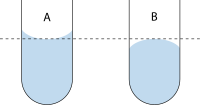Chemistry class in vocational school

The chemistry class at the vocational school differs from general chemistry class in that here on the fundamentals of chemistry should be taught beyond knowledge and skills to practice a profession in the field of chemistry and learned. These relate in particular to the working methods in the chemical laboratory as well as in the analysis and production of chemical products.
Chemistry lessons in the dual system of the vocational school
In the dual education system, the curriculum is also determined by the training companies (or their representatives such as the Chamber of Industry and Commerce IHK). Chemistry lessons in the vocational school can - as in the majority of the apprenticeships - be supplemented by in-company lessons. The educational content and goals are determined by the respective subject area of the desired professional qualification: Chemical laboratory assistants and chemical-technical assistants receive their respective specialist knowledge more in the field of laboratory working methods, chemical laboratory junior workers, chemical technicians and chemical production specialists in chemical engineering. Chemical reactions and other basics of chemistry, including the basic laws of chemistry, form the content of the introductory lesson (1st year of training). Didactically, the lessons can be B. be based on Georg Kerschensteiner and other, more modern training concepts (see under chemistry didactics ).
Lesson content based on two examples: chemical laboratory assistant and chemical-technical assistant
The training to become a chemical laboratory assistant takes place in the training company as well as in the vocational school. It usually includes the core areas of qualitative analysis and quantitative analysis . Analytics , process engineering , physical chemistry and apparatus-preparative chemistry (synthesis technology) are further training contents. After the first two years of training, the content of the chemistry lessons specialize in different directions: Depending on the training company, these are, for example, methods of chemical research, food chemistry , petrochemistry and others. In paint production companies (coating materials / techniques) z. B. specially trained paint laboratory technicians and plastic formers in plastics production companies.

The chemical-technical assistant (CTA) training takes place exclusively at public and private schools. As a rule, it lasts two, often three years. It includes theoretical and practical lessons in the laboratory; both in approximately the same amount of time. The practical subjects of instrumental analysis and preparative chemistry as well as the theoretical subjects of general chemistry and organic chemistry are the main subjects in the vocational area.
At some schools you can also choose to specialize in environmental protection assistant (UTA) after the first year of school . Then the theoretical subjects biology , ecology , environmental law and process engineering are taught.
Training occupations with vocational chemistry lessons

Vocational chemistry lessons are (co) taught in the training of the following professions:
Laboratory professions
- Laboratory assistant
- Chemical-Technical Assistant (CTA)
- Building material tester
- Biology laboratory technician
- Precious metal tester
- Paint laboratory technician
- Agricultural-technical laboratory assistant
- Agricultural laboratory technician
- Dairy laboratory technician
- Pharmaceutical Technical Assistant (PTA)
- Physics laboratory assistant
- Substance testers (chemistry) - glass, ceramic industry as well as stones and earth
- Textile laboratory technician
- Material tester
- Environmental technical assistant
Physical / chemical production jobs
- Chemical production specialist (formerly Operating young workers ) and chemistry laboratory young workers
- Chemical technician
- Pharmacist
- Wax puller
Chemistry classes at the vocational school take place for trainees outside of the chemistry professions as a general subject - usually in the elective area. Apprentices in chemistry professions have to take chemistry lessons as a compulsory vocational subject, as they have to acquire practical, job-specific knowledge in addition to basic knowledge.
Teaching works in chemistry classes at vocational schools (selection)
- Brackmann, Peter, Grote-Wolff, Astrid a. a .: Specialist knowledge chemistry 1: core qualifications for laboratory professions, Europa-Verlag, Haan-Gruiten 2011, 1st edition, ISBN 978-3-8085-6991-7 (for apprentices as chemical laboratory technicians and similar laboratory professions)
- Wächter, Michael: chemistry laboratory. Introduction to Laboratory Practice, Wiley-VCH, Weinheim 2011, 1st edition, ISBN 978-3-527-32996-0 (for first-year chemistry students at universities and universities of applied sciences, for apprentices as chemical-technical assistants, CTA, chemical laboratory technicians, etc.)
- Ignatowitz, Haering: Chemistry for school and work. Europe teaching aids, Haan-Gruiten; ISBN 3-8085-7054-7 (For introductory chemistry lessons, chemistry as a general subject at the vocational school)
- Brink, Fastert, Ignatowitz: Technical mathematics and data evaluation for laboratory professions. Europe teaching aids, Haan-Gruiten; 1st edition 2002; ISBN 3-8085-7171-3 (stoichiometry / technical computing chemistry, for chemical professions )
